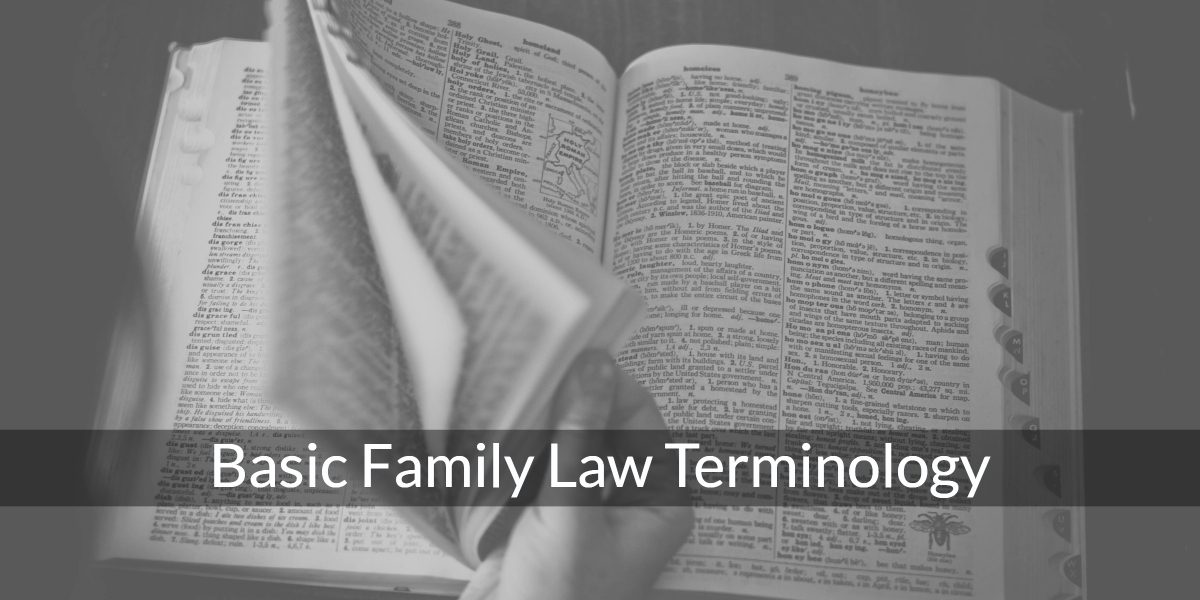If you are someone just beginning the process of separation or divorce, here are some common family law terms you should be familar with.
The time a parent spends with a child. Also known as parenting time which is the legal term under the BC Family Law Act.
This is not a term normally used in BC. Here, this is called spousal support.
A written agreement usually prepared by one party’s lawyer to outline what will happen if the couple breaks up. This kind of agreement is often required when one person in the couple is coming into the relationship with a lot more assets than the other person and wishes to preserve the value of those assets for him or herself. It is often useful for those who have been married before or who may be widowed.
Time spent with a child by a person who is not a parent. For example, a grandparent or a step-parent could have contact granted by the court.
There are a number of items that can be excluded from family property and therefore do not have to be divided. The main ones are gifts or inheritances from third parties (your parents for example). The amounts of these assets may be excluded but if they have, for example, been invested, then the increase in value is a family asset to be shared. Sometimes, where there is a cohabitation agreement or a pre-nuptial agreement, the parties have agreed that even the increase in value is excluded property and belongs solely to the person who brought the asset into the relationship.
Property does not have to be jointly owned, or in joint names, to be family property and to be subject to division between the separating couple. Property in a spouse’s sole name is likely to be considered family property and divided 50/50 in most cases. The same goes for family debt. Income tax debt is often a large bone of contention between separating couples.
There is no such thing as a “legal” separation in BC. If a couple decides to separate once their relationship breaks down, then they are separated. Period. They can still be separated even if they continue to live under the same roof for a time. The key is intention (do you intend to be separated from your spouse, to be no longer married).
Sometimes used when referring to support payments. This is not a term normally used in BC. We use child support or spousal support.
A written agreement usually prepared by one person’s lawyer to be signed before the parties marry (pre-nuptial) or even during the marriage. Both parties should have independent legal advice before signing any agreement of this sort. These agreements normally deal with property and spousal support issues but can address future responsibilities relating to children if desired. The primary concern for the person asking for a pre-nuptial is protecting assets they are bringing into the marriage, at least for a period of time, and either not paying or limiting payment of spousal support on marriage breakdown.
A document that is filed with the court to start a divorce and/or family law case (it replaces the old writ and statement of claim documents). In this document, the claimant (formerly the plaintiff) outlines what they are claiming against the other party such as a divorce, child and/or spousal support, equal or unequal division of assets, restraining order (freezing order), protection order (if there is family violence) or exclusive occupation of the family home. After this document is filed, it must be served personally on the respondent (formerly the defendant).
A document filed in court by the respondent which shows what their position is on each of the claims made by the claimant (it replaces the old statement of defence document). A respondent will often file a Counterclaim setting out what they want at the end of the case, if different from the claimant. For example, the respondent may also want support and may want an unequal division of property or a reapportionment in their favour (e.g. 60/40 instead of 50/50).
A written agreement negotiated by the couple usually with the assistance of their lawyers. This agreement is intended to deal with all issues arising from the relationship breakdown so is generally long, detailed and comprehensive. These agreements are generally upheld by our courts unless, for example, one party has failed to disclose important financial information to the other party before they sign the agreement or if the court thinks that the agreement is significantly unfair based on a number of factors. A family law lawyer can explain all of this is much greater detail so that a spouse can fully understand their rights and obligations.



